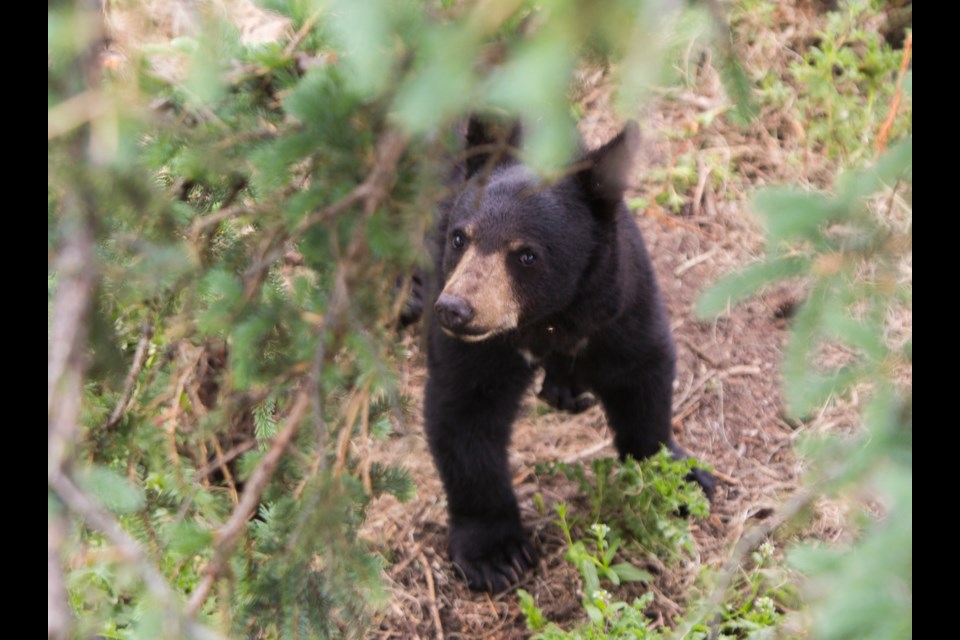ROCKY VIEW COUNTY— The Cochrane Ecological Institute has received approval from the provincial government to continue serving as a home to rehabilitate orphaned bear cubs.
The approval comes just in time, said the Institute's president Clio Smeeton, as the spring bear hunt began on April 1 and runs until June 15.
It is illegal to shoot a black bear with cubs, but there are times when cubs are accidentally orphaned when a female is shot by a hunter who mistakes a female for a male.
It can be challenging to discern the difference between male and female bears and the easiest way to tell is if cubs are nearby, Smeeton said. She explained this becomes complicated because hunters can bait bears in the spring and fall.
“What happens is a hunter baits a bait barrel with delicious food and then puts it out … When the bear comes and sticks its head in the barrel, he kills it,” Smeeton said. “The cubs don’t come out to the barrel. The cubs stay behind. That’s how come hunters kill females by accident.”
Hunters can then find the orphaned cubs, who can then find a safe haven at the Cochrane Ecological Institute.
The Institute received authorization to rehabilitate black bear cubs at the end of March.
Alberta Environment and Parks will maintain responsibility for the collection and release of the bears, including the transfer and monitoring of the animals. The goal is to see all bears released by Oct. 15, but there is wiggle room to extend the process on a case-by-case basis.
As part of the permit, black bear cubs can only be admitted to the facility between Jan. 1 and July 1 of any year and must weigh 15 kg or less.
The Institute is not allowed public visitation or observation of any black bear cubs at the facility and only designated staff members are allowed to work with the animals.
The approval expires on March 31, 2022.
A spokesperson for Alberta Environment and Parks said the Cochrane Ecological Institutes black bear cub rehabilitation permit is renewed annually. They noted the Institute took in one black bear cub in 2020.
"We continue to work with permitted wildlife rehabilitation facilities like the Cochrane Ecological Institute to ensure that the best scientific practices are followed when bears are rehabilitated and released. This includes limiting habituation to humans," reads the statement.
Alberta Environment Parks said if a bear cub is spotted it may be orphaned or may be temporarily left by the mother who could be foraging. It is not recommended to try to capture the cub.
Phone Report a Poacher at 1-800-642-3800 if you spot a bear cub in need. A qualified wildlife professional will be available to monitor the situation, judge if the cub is orphaned and take steps to find the animal the help it needs.
Traditionally Fish and Wildlife brought orphaned cubs to the Institute, but this changed in 2012.
“Before the changes in the setup happened the Fish and Wildlife officers would bring the orphaned bear cubs to us and they would be familiar with ecosystems and they would know where there are a lot of bears and where there weren’t,” Smeeton said. She added this also played a pivotal role in understanding the best spaces to release cubs.
This lack of understanding can at times impact the release of the cubs, she said, citing the province's proposed release of the bear cub Siksi'naam, bear BB006, into the Ghost Public Land Use Zone in October of 2020.
The decision was met with public outcry as the area has multiple land uses including logging, camping, hunting and recreational vehicle access. The bear was eventually released to another location.
The incident highlighted the large knowledge gaps that can occur when orphaned bear cubs are released into the wild in unsurveyed and unresearched sites, Smeeton said.
To combat these gaps the Institute is hoping to engage in scientific research to better understand how rehabilitated bears survive and move in the wild.
“We want to find out what happens,” Smeeton said. “There’s so many things to look at.”
They are exploring ways to pursue this project and are working on obtaining a research permit from the provincial government.
The proposed project would engage with third-party advisors from universities and other diverse backgrounds to grow the project and the Cochrane Ecological Institute would be provided for their use.
Smeeton hopes if the project can take wings, it will enable researchers to unpack and understand what happens to the bears once they are released into the wild.
The ultimate goal would be to see research span five years instead of just for five months after the initial release of a bear.
The additional information gained through a study would be pivotal because it would add further insights into bear populations in Alberta and establish a better understanding of how many animals call the province home.
The proposed project is especially focussed on Albertans and understanding how climate and habitat change has resulted in increasing number of wild animal orphans. As part of this initiative Smeeton hopes to hear from Albertans and find out their opinions on orphaned animals and potential mitigation steps that could be taken to support them.
“Orphan bear cubs need rescue,” Smeeton said. “Nobody has researched it so nobody can tell."
She added April is the time of year bears become active in the area and urged community members to keep an eye out and bear smart their properties to avoid interactions.
"No one wants bears to come into communities, so please be very sure your garbage is locked up and bird feeders are empty. It is just for a short period and as soon as the grass grows green and the bushes bud bears will go back to the bush," Smeeton said.




